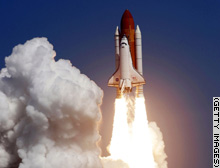Launch, Minus 8 Days

If you have been following news coverage of the space shuttle Atlantis, you many have noticed that reports kept repeating that the window for the Atlantis launch was narrow in order to avoid a cosmic traffic jam. The reason is that the Russian Soyuz carrying our T cell experiment is scheduled to launch September 18th and only one spacecraft can dock with the International Space Station (ISS) at a time. The original launch date for the Soyuz was September 14th. It was pushed back to the latest possible date, the 18th, to accommodate the Atlantis mission. The Atlantis launch had been delayed for weeks, first from weather (Hurricane Ernesto) and more recently over safety concerns of the fuel cells. Yesterday was the absolute last day Atlantis could launch, complete its mission, and still allow the Soyuz to launch as scheduled. The Atlantis lifted off and entered orbit beautifully. Its mission would last 11 days. This means the Atlantis will be leaving the ISS just as the Soyuz arrives. What a busy day that will be for the Space Station!
Astronauts of the Atlantis will perform 3 spacewalks to install two new solar panels on the ISS. This is the first mission to continue construction of the Space Station since the Columbia tragedy 3 years ago. In strange parallel, this coming Soyuz launch will be the first time T cells return to space since Columbia. As part of ongoing efforts to understand immunosuppression in space, Columbia had carried the same T cell experiments on board. Those experimental samples, and the lives of of entire crew, were lost when the shuttle broke apart on re-entry.
I could remember exactly where I was when I heard the Challenger exploded soon after lift off in 1986. It seemed unbelievable. Just when going into space seemed as easy as going to the corner store, seven lives were lost in a flash in that effort. Years later, Columbia was another painful reminder that space flight, like any pioneering endeavor, was dangerous and had no guarantees.
The lives of the scientists involved in the original T cell experiments on board Columbia were personally touched by the tragedy. Perhaps so, they were more determined that the work must continue. Perhaps there was a sense that the significance of what the crew did must now justify the loss of their lives. The pursuit of the answers they sought should not perish with their vessel. The science they were performing should not be allowed to disappear without conclusion. Indeed, we may not be able to prevent all the unforeseen disasters or predict all the potential failures, but we can make space travel as safe as possible with the science and technology at our disposal. Understanding the biology of the immune system in space and why it may not function properly is an important part of keeping astronauts safe in long duration space travel. For the scientists of the T cell project, finally having an answer to those experiments will be the best tribute to the brave men and women of Columbia who lost their lives as pioneers of our age.
And so, with such emotions, we await our launch.

0 Comments:
Post a Comment
<< Home